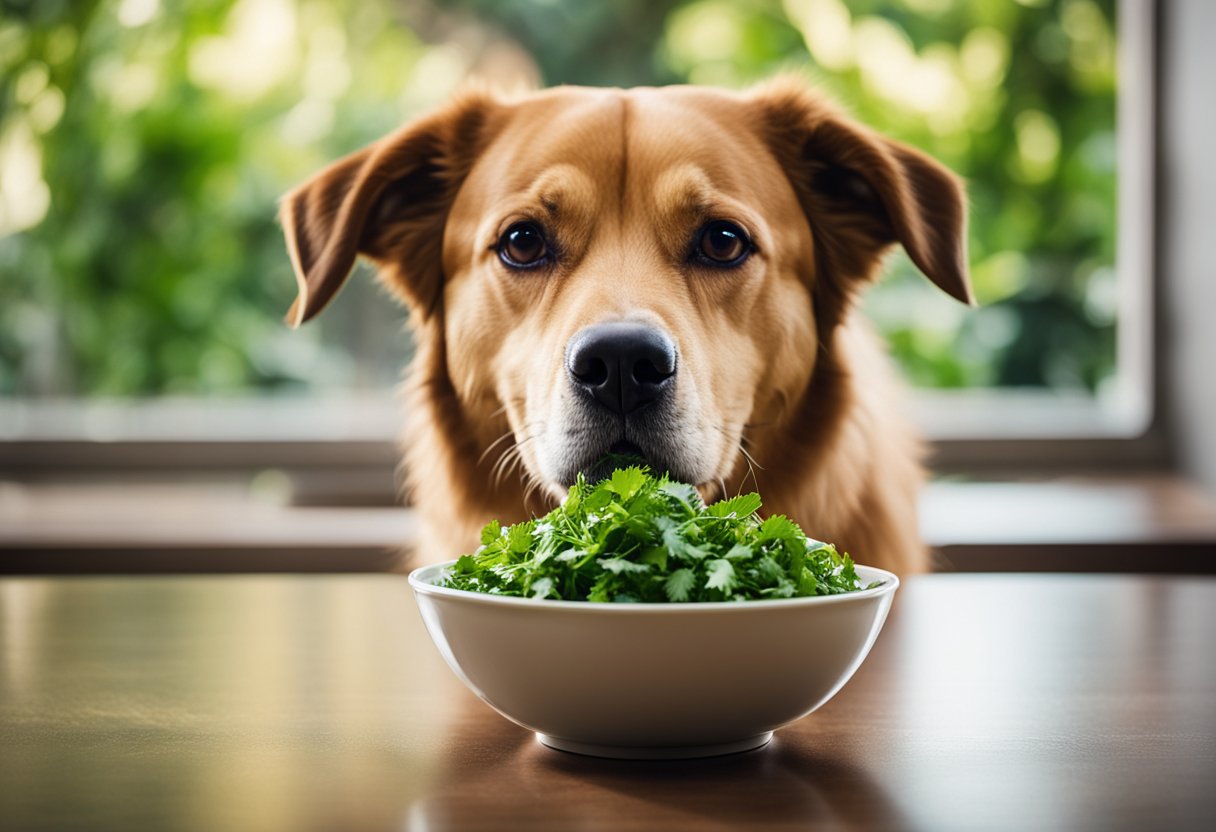Cilantro is a herb that is commonly used in various dishes, and it has become increasingly popular among pet owners as a way to supplement their dog’s diet. However, you may be wondering whether cilantro is bad for dogs or not. The answer to this question is that cilantro is generally safe for dogs to eat, but there are some important things to keep in mind.

While cilantro is not toxic to dogs, some dogs may not like the taste of it. Additionally, feeding your dog too much cilantro can lead to gastrointestinal issues, such as vomiting and diarrhea. Therefore, it’s important to feed your dog cilantro in moderation and to monitor their reaction to it. If you notice any adverse effects, it’s best to stop feeding them cilantro immediately.
Overall, cilantro can be a healthy addition to your dog’s diet in moderation. It contains essential vitamins and minerals that can benefit your dog’s bone, skin, eye, and immune health. However, it’s important to keep in mind that every dog is different, and what works for one dog may not work for another. As always, it’s best to consult with your veterinarian before making any significant changes to your dog’s diet.
Cilantro and Canine Health
If you’re wondering whether cilantro is safe for your furry friend, you’re not alone. While cilantro is generally safe for dogs to consume, there are a few things you should keep in mind.
Nutritional Benefits for Dogs
Cilantro is a herb that is packed with essential nutrients that can benefit your dog’s health. For example, cilantro is rich in vitamin A, which can help maintain healthy eyesight. Additionally, cilantro contains vitamin C, an antioxidant that can support your dog’s immune system.
Furthermore, cilantro is a good source of potassium, which can help regulate your dog’s blood pressure. It also contains calcium, which can help maintain strong bones and teeth. Moreover, cilantro is rich in magnesium, which can help support your dog’s muscle and nerve function.
Potential Risks and Side Effects
While cilantro is generally safe for dogs, there are a few potential risks and side effects to be aware of. For example, some dogs may experience digestive issues after consuming cilantro. If your dog experiences vomiting or diarrhea after eating cilantro, you should stop feeding it to them.
Additionally, some dogs may be allergic to cilantro. If your dog experiences symptoms such as itching, swelling, or difficulty breathing after consuming cilantro, you should seek veterinary care immediately.
Overall, cilantro can be a healthy addition to your dog’s diet if consumed in moderation. However, it’s important to monitor your dog’s reaction to cilantro and consult with your veterinarian if you have any concerns about their nutrition.
Feeding Guidelines for Cilantro
Cilantro is safe for dogs to eat and can be incorporated into their diet in small quantities. It is a good source of vitamins and minerals and can help with digestion. However, it should be noted that some dogs may not like the taste of cilantro and may refuse to eat it.
Incorporating Cilantro into Dog Food
Cilantro can be added to dog food as a sprinkle or garnish. It can also be blended into homemade dog treat recipes. When incorporating cilantro into your dog’s diet, it is important to start with small quantities and monitor your dog’s reaction. If your dog experiences any gastrointestinal upset, such as vomiting or diarrhea, discontinue feeding cilantro.
Quantities and Frequency
When feeding cilantro to your dog, it is important to do so in moderation. Too much cilantro can lead to gastrointestinal upset. As a general rule, you should feed your dog no more than one tablespoon of cilantro per 20 pounds of body weight per day. It is also recommended to feed cilantro to your dog no more than twice a week.
In conclusion, cilantro is safe for dogs to eat in small quantities and can provide nutritional benefits. When incorporating cilantro into your dog’s diet, start with small quantities and monitor your dog’s reaction. If your dog experiences any adverse reactions, discontinue feeding cilantro.
Recognizing and Addressing Adverse Reactions
Cilantro is a safe and healthy herb for dogs to consume in moderation. However, some dogs may experience adverse reactions after consuming cilantro. In this section, we will discuss how to recognize and address these reactions.
Identifying Allergic Reactions
Some dogs may have an allergic reaction to cilantro. If your dog is allergic to cilantro, they may exhibit symptoms such as coughing, itching in the mouth, and rashes. Other possible symptoms include shortness of breath, wheezing, tingling in the mouth, and itching in the mouth. If you notice any of these symptoms after your dog consumes cilantro, it is best to avoid giving them cilantro in the future.
Managing Digestive Upset
In some cases, cilantro may cause digestive upset in dogs. This can lead to symptoms such as vomiting, diarrhea, upset stomach, and gas. If your dog experiences these symptoms after consuming cilantro, you can help manage their discomfort by providing them with plenty of water and a bland diet. You can also try giving them supplements such as probiotics or digestive enzymes to help support their digestive system.
It is important to note that digestive upset can also be caused by infections or other gastrointestinal issues. If your dog experiences persistent vomiting or diarrhea, bloating, or discomfort, it is best to consult with your veterinarian to rule out any dangerous conditions.
Conclusion
While cilantro is generally safe for dogs to consume, it is important to monitor your dog for any adverse reactions. If your dog experiences any symptoms such as vomiting or diarrhea after consuming cilantro, it is best to avoid giving them cilantro in the future. With proper monitoring and care, you can help ensure that your dog stays healthy and happy.






